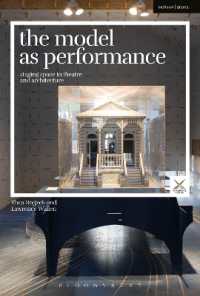- ホーム
- > 洋書
- > 英文書
- > Business / Economics
Full Description
Everyone in an organization, from cleaner to CEO, has expert knowledge. Yet only a fraction of it can be codified and expressed explicitly as facts and rules. A little more is visible implicitly as accepted procedures, but even this is only the beginning. Submerged beneath the explicit and implicit levels is a vast iceberg of tacit knowledge that cannot be reliably accessed by traditional analytical approaches. And yet, without it, organizational learning means little. Interweaving theory with practical guidance, this book looks at the importance of tacit knowledge and shows how it is now being put in motion through groundbreaking analogical thinking methods. Chief among these is the Dialogue Seminar, developed by the editors, in which learning is seen as arising from encounters with differences.
There can be no consensus on the value of corporate knowledge until what is meant by that knowledge is discussed and defined. Based on two decades of research and a host of practical cases, this book offers a way forward.
"Göranzon argues that the question of whether machines can think is not the right question to ask. The more important question, he believes, is the impact of automation on work and human skills, and he is looking for a way of describing skills that allows us to discuss this question."
—Janet Vaux, New Scientist
"A Swedish initiave to rethink the relationship between learning and work."
—Rolf Hughes, The Times Higher Education
Contents
List of Contributors ix
Introduction 1
Richard Ennals
Part 1 Dialogue and Skill 7
Chapter 1 The Practice of the Use of Computers: A Paradoxical Encounter between Different Traditions of Knowledge 9
Bo Göranzon
Chapter 2 Writing as a Method of Reflection 22
Maria Hammarén
Chapter 3 The Dialogue Seminar as a Foundation for Research on Skill 46
Adrian Ratkic
Chapter 4 The Methodology of the Dialogue Seminar 57
Bo Göranzon and Maria Hammarén
Part 2 Theatre and Work 67
Chapter 5 A Dwelling Place for Past and Living Voices, Passions and Characters 69
Erland Josephson
Chapter 6 Theatre and Knowledge 73
Allan Janik
Part 3 Case Studies 85
Chapter 7 Dialogue Seminar as a Tool: Experience from Combitech Systems 87
Niclas Fock
Chapter 8 Maximum Complexity 110
Christer Hoberg
Chapter 9 Better Systems Engineering with Dialogue 135
Göran Backlund and Jan Sjunnesson
Chapter 10 Some Aspects of Military Practices and Officers' Professional Skills 152
Peter Tillberg
Chapter 11 Science and Art 175
Karl Dunér, Lucas Ekeroth and Mats Hanson
Part 4 Dialogue Seminar As Reflective Practice 187
Chapter 12 Tacit Knowledge and Risks 189
Bo Göranzon
Chapter 13 Skill, Storytelling and Language: on Reflection as a Method 203
Maria Hammarén
Chapter 14 Reading and Writing as Performing Arts: at Work 216
Øyvind Pålshaugen
Chapter 15 Knowledge and Reflective Practice 229
Kjell S. Johannessen
Chapter 16 Dialogue, Depth, and Life Inside Responsive Orders: From External Observation to Participatory Understanding 243
John Shotter
Part 5 Tacit Knowledge and Literature 267
Chapter 17 Rule Following, Intransitive Understanding and Tacit Knowledge: An Investigation of the Wittgensteinian Concept of Practice as Regards Tacit Knowing 269
Kjell S. Johannessen
Chapter 18 Henrik Ibsen: Why We Need Him More Than Ever 295
Allan Janik
Part 6 Conclusions 305
Chapter 19 Theatre and Workplace Actors 307
Richard Ennals
Chapter 20 Training in Analogical Thinking: The Dialogue Seminar Method in Basic Education, Further Education and Graduate Studies 320
Bo Göranzon, Maria Hammarén, Adrian Ratkic
Index 334







